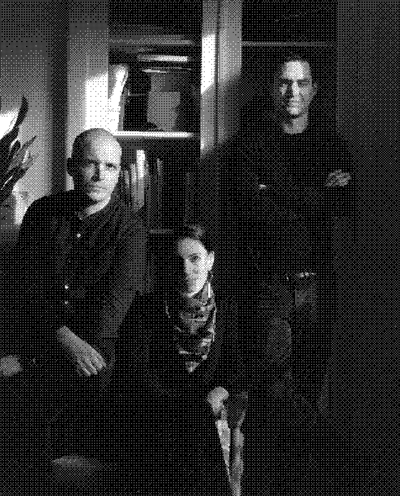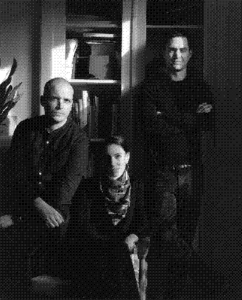References Development Strategy Advice Management Prospective Creativity Clients Communication Process Prospection Work culture Competition Presentation Design Typography Agents Advertising Ai Finance Architecture Investment Education Cgi Trend Fashion Recruitment Graphic design Nft Music Marketing Photography Sound design Research Blockchain Sustainability Crypto Technology Metaverse
15 excerpts on the topic “Agents”
[…] Special Offer has never had an agent or worked with an agency. We’ve never had someone else out there promoting our work or trying to bring us projects. It’s always been on us. There have definitely been times when I wished that wasn’t the case, but in the end, it’s allowed us to maintain control over the projects we take on. Whether in good times or bad, this independence has helped us align our work with the direction we want to go as a business. To welcome the things you want, you have to create the world you envision. […]
[…] I’d like to work with someone who can help manage the bureaucracy and administrative tasks—in Italy, it’s a real mess! While we’re not actively seeking an agent, we’re always open to hearing what opportunities might arise. […]
[…] I do think there are certain industries where management / agency representation can be beneficial. For example, especially when working with artists, musicians, and fashion. I think it’s case by case but I don’t really see us being represented as a whole. […]
[…] I’ve thought about it, particularly for cities like Paris or London. Our multifaceted identity has made it a challenge to find the right fit. We started primarily in fashion as art directors, where having an agent is common, but being both a studio and an agency complicates things. Although I admire some agencies and would like to be represented by them, it’s difficult for them to categorise us since we do more than just art direction. I’m open to the idea if the right opportunity and person come along. […]
[…] For artists or designers, having an agent can be beneficial because it allows them to concentrate on their creative work, leaving the business dealings to someone else. However, an agent needs to sell a specific style or package, which works well for illustrators with a distinct style. When you have a broader, integrated approach, like we do, it’s more complicated. Studios like M/M Paris or OK-RM might find having an agent more suitable due to their size and distinct identities. […]
[…] My first agent represented exclusively artistic directors. My thought after this experience was that an AD agent—an agent who only works with artistic directors—doesn’t make sense. A photographer can potentially shoot every day or at least several times every week or month. Meanwhile, an artistic director can work on one project for several months or even a year. So the point of contact between agent and client and the frequency of discussions is completely different. […]
[…] For a single artist they represent, a photographer’s agent will speak to several clients on a daily basis and gather an important mass of information: professional commercial intelligence. Conversely, an artistic director’s agent will have only one client, so only one source of information. The agent is thus cut off from a lot of opportunities by only working with artistic directors. Unless they are an artistic director agent in a traditional agency that represents other types of talent. On a daily basis, what is also complicated is that the relationship between the client and the artistic director is so strong and deep that the agent can have difficulty finding their place… and participating in the discussion every day for six months basis is not tenable. […]
[…] Joseph, who is my agent today, was handling my project and at the time he asked me, “Should we give you a contract so that we can represent you officially?” And I wasn’t super comfortable with the contract because at the time, I didn’t really need people to bring me clients because they would contact me directly. I would say to them, “Well, if the clients contact me directly, you can’t take the same commission you take with photographers for whom you find clients because you aren’t doing the same work.” Then Joseph left Management Artists and we met up and I asked him what he wanted to do on his own and if he wanted to continue to represent me. We worked out a deal between the two of us and he said yes. So he doesn’t do any prospecting, but he does the negotiating for all the big-budget projects. […]
[…] I had a long history with agents, and it just wasn’t working as it was supposed to. When young artists already have their clients, they don’t need an agent, in my opinion. If you have a strong portfolio but struggle to get clients or commissions, it might be a good idea to get one. […]
[…] The last time I was represented, I was amazed at first because they grouped the best creatives in the world, but to be honest, I expected a lot more production help from them, not only managing the clients and writing emails. […]
[…] agents are handling part of photography production, but not CGI; they still don’t understand the pipeline of 3D. I believe in a few years they will be able to take that part of the production, as they do with photographers, but for the moment, I haven’t had the chance to work with anyone who could help me with it. […]
[…] This is something that I would definitely recommend to anyone who is looking for an agency: to just really test the waters, to really understand how you both can contribute to this relationship, and what it does for you and what you can do for it as well. I cannot read the young photographers’ minds, but I do remember what I was expecting of an agency when I was younger, and in my head it was some kind of magical unicorn that would make my life better, provides a magical amount of jobs or something like that. But before you get a representation that really suits you, you have to learn everything about yourself, understand what you really want, what you don’t want, how you value yourself, how you want to speak with the client, what you have to learn to make these decisions… Otherwise, you could be represented by any type of agency – no matter how big or meaningful – and it will end in tears, for obvious reasons. […]
[…] It’s not about the agency that you go with, it’s really about your relationship with your agent. In that way, it kind of relates to psychology and psychotherapy, funnily enough. (…) It’s a ton of work on yourself, coming from yourself. I will say that 70% of the success in your psychotherapy will depend on whether you are compatible with your psychotherapist, whether you like them or you don’t. There is going to be a lot of real human interaction that resembles friendship – but it’s really not quite friendship. It’s more like a work relationship, a friendly collaboration, it’s a very grey‑zony situation, and you need to truly enjoy this person. You also need to really trust this person, you need to really respect them, you need to want to talk to this person five times on a daily basis if necessary. You need to be able to invent creative ideas together, and it needs to really spark between you two in a way. So you see how precise and specific this is. Obviously, you cannot have this type of relationship with any agent out there. It needs to be that one person. It’s almost like finding a relationship, like a partner in life. And that can take a lot of time. […]
[…] You also shouldn’t be trying to be a good client. You should be exactly who you are. Obviously, trying to be the best version of yourself, but not accommodate yourself to any agent out there. You need to find the one who is truly going to be compatible with you, just like clicks. I don’t think you can understand that as long as you haven’t experienced either that or the opposite. When you try to be a good patient lying to your therapist, you’re like: “Oh, everything’s fine, I haven’t cried”. And it’s not fine, you’re trying to be easy, but you’re actually intense and annoying. You want to know every single detail about the job and the client, and you shouldn’t try to accommodate your agent, but you should actually be aware that you need to be exactly who you are. Because this is how you get the best results. […]
[…] We did get a few extra projects over the course of a year, but we had meetings that got us nowhere. I was always afraid that it would cut us off from our clients. I like to have a direct relationship with a client (…) I have noticed that some agents suggest certain solutions because they have been known to succeed in the past. You’re supposed to listen… But I understood early on that it was important for us to do directly what we wanted to do (…) And then there’s also the economic aspect: the agent’s percentage… That being said, we might find the right partnership with an agent in the future, strategic, creative and financial. […]

